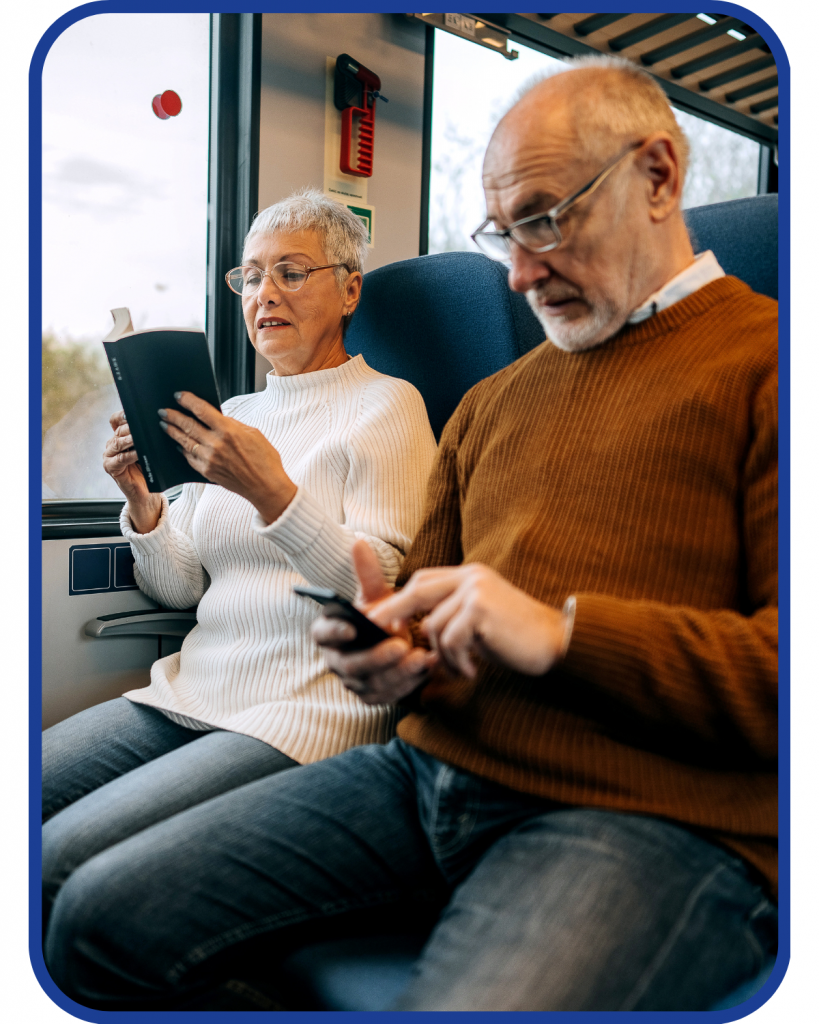Senior Travel Made Easy: Expert Tips for a Memorable Journey
For seniors, travel can be especially challenging or risky. Use these top tips to make senior travel fun and safe.
As adults age, their family members tend to act as long-distance caregivers. The average distance a long-distance caregiver lives from a senior is 450 miles. That means if seniors travel to see their loved ones, they often go a long way. (Caregiver.org)
It’s common for seniors to have a little trouble getting around like they used to. So, it’s not surprising that long-distance travel can be a real challenge. Here’s how to make travel safer and more comfortable for aging adults.
Options for Travel for Seniors
Although seniors can travel by plane, train, or car, each option has pros and cons.
TRAVELING BY PLANE
Pros:
- A fast form of travel
- Can earn loyalty program points
- Often accommodates disabilities
Cons:
- Airports can be overwhelming
- Might be expensive
- Some are afraid of flying
TRAVELING BY TRAIN
Pros:
- Access to many locations
- Passes by moderately fast
- May allow for socializing
Cons:
- Routes can be inconvenient or confusing
- Limited options for stops and pricing
- Limited accessibility for those with disabilities
TRAVELING BY CAR
Pros:
- Control over routes/stops
- Can add cushions/supports for comfort
- Often most affordable
Cons:
- Can take a long time
- A possibility of getting lost
- Driving alone may not be safe (AARP)
How Seniors Can Travel with Ease
For safe, comfortable, and fun travel experiences, seniors can use the following tips:
Prepare Ahead of Time
- Practice using a map app, write down directions
- Contact airports or train stations to learn about available assistance options
- Pack vital items in a carry-on or easily accessible bag in case of emergency or change of plans
- Research parking options (get a disability tag if necessary)
- Consult a doctor about plans if travel is a concern for medical reasons
- Know where medical facilities are located at the travel destination
Ask Questions
Don’t be afraid to ask other people for help while traveling. Approach people who work wherever you are (in a hotel, airport, etc.) for safety reasons. Never offer strangers more details than necessary when asking for help.
 Bring Someone/Share With Loved Ones
Bring Someone/Share With Loved Ones
- Find a friend or relative to travel with
- Inquire about traveling caregivers if assistance will be needed
- Share your location on your phone, as well as copies of your itinerary, with loved ones (Better Health Channel)
A Senior’s “Bonus” Packing List
Although some of these items may be on most adults’ packing lists, they tend to be extra important for seniors to ensure their safety and comfort:
- Medications/supplements
- Support pillows or cushions
- Ambulatory/medical devices
- Hearing aid batteries
- Incontinence supplies
- Doctor list/medical alert information
- Compression socks
- Dentures holder/cleaner (USA Today)
With proper preparation and a few helpful tips, seniors can embark on safe and enjoyable travel adventures. Whether visiting family and friends, fulfilling bucket list goals, or seeking medical specialist appointments, travel offers many possibilities for seniors to create cherished memories.
 Caregiver Tip
Caregiver Tip
For caregivers accompanying seniors on their journeys, it’s important to understand their unique needs and preferences. Encourage flexibility in their plans to allow for downtime and rest, and try to involve them in the decision-making process. Caregivers can play a crucial role in ensuring that seniors have a fantastic and fulfilling travel experience by providing companionship, assisting with logistics, and being attentive to their well-being.


